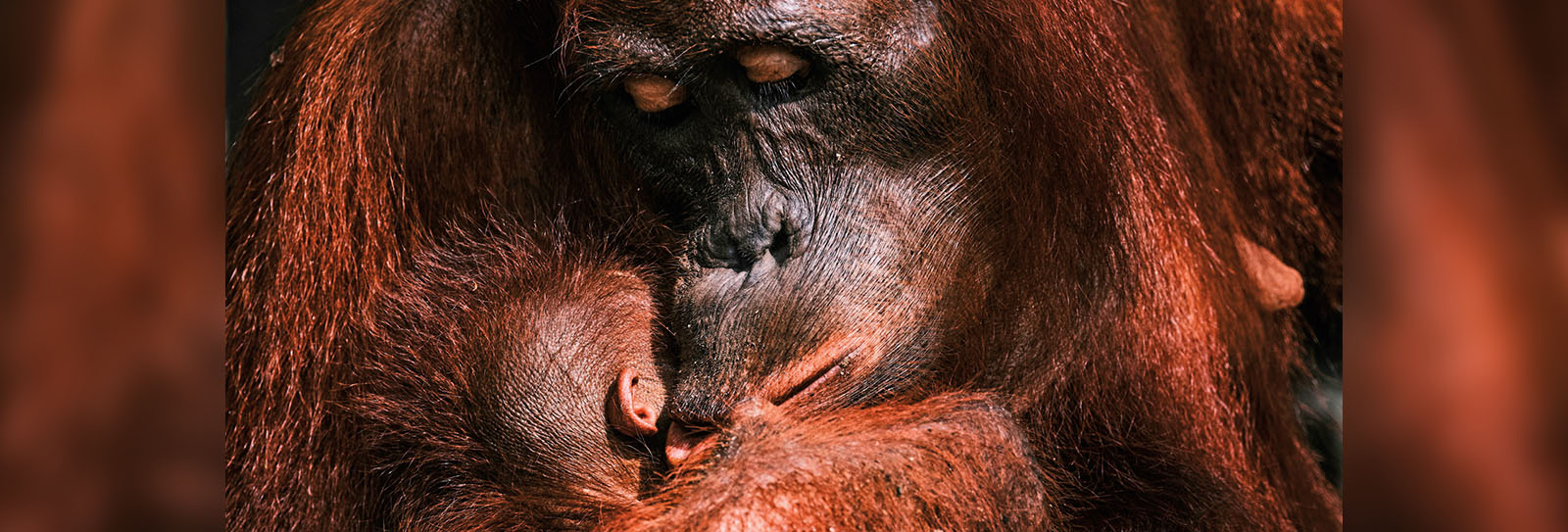
Spotlight on Photography: Orangutan Mother and Baby in Borneo
For more than eight hours, we navigated the Sekonyer River in a wooden boat, cruising through Tanjung Puting National Park in the Central Kalimantan region of Borneo, Indonesia.
For more than eight hours, we navigated the Sekonyer River in a wooden boat, cruising through Tanjung Puting National Park in the Central Kalimantan region of Borneo, Indonesia. After docking, we walked about an hour in the lush rainforest. Then, our tour guide and ranger, Adut, placed corn and yams on top of a wooden table.
It was not long until orange-haired Bornean orangutans began to approach the table. More than five were carrying babies. Seeing so many newborns was, Adut informed us, highly unusual. He conjectured that the park’s closure and resulting prolonged quiet due to the pandemic may have contributed to an optimal primate mating environment.
Observing the orangutans, I saw how intimately bonded the mothers were to their babies and how deeply they seemed to express love in every movement with them. As I watched a nearby mother and infant embrace, I photographed this magnificent moment as the mother was tenderly kissing her child’s neck.
Orangutans are listed as critically endangered on the International Union for Conservation of Nature’s Red List of Threatened Species, mainly because of habitat loss—in Indonesia they have lost 80 percent of their forest area. Sanctuaries like the Tanjung Puting National Park are helping to preserve their lives and future. And while I was happy to see so many new families among them, it impressed on me the urgency of finding ways to thwart deforestation.
—Beawiharta
@beawiharta
You may also be interested in...

Find Ramadan Lanterns on Cairo's Streets with John Feeney
Arts
In the March/April 1992 issue, writer and photographer John Feeney took AramcoWorld readers on a walk through the streets of Cairo during Ramadan.
Ithra Explores Hijrah in Islam and Prophet Muhammad
History
Arts
Avoiding main roads due to threats to his life, in 622 CE the Prophet Muhammad and his followers escaped north from Makkah to Madinah by riding through the rugged western Arabian Peninsula along path whose precise contours have been traced only recently. Known as the Hijrah, or migration, their eight-day journey became the beginning of the Islamic calendar, and this spring, the exhibition "Hijrah: In the Footsteps of the Prophet," at Ithra in Dhahran, Saudi Arabia, explored the journey itself and its memories-as-story to expand understandings of what the Hijrah has meant both for Muslims and the rest of a the world. "This is a story that addresses universal human themes," says co-curator Idries Trevathan.
Spotlight on Photography: Arabs In America
Arts
In 1975 AramcoWorld dedicated an entire issue to celebrating the lives of Arab Americans and their impact—from renowned heart surgeon Michael DeBakey to White House correspondent Helen Thomas to entertainer and St. Jude Children’s Research Hospital founder Danny Thomas.